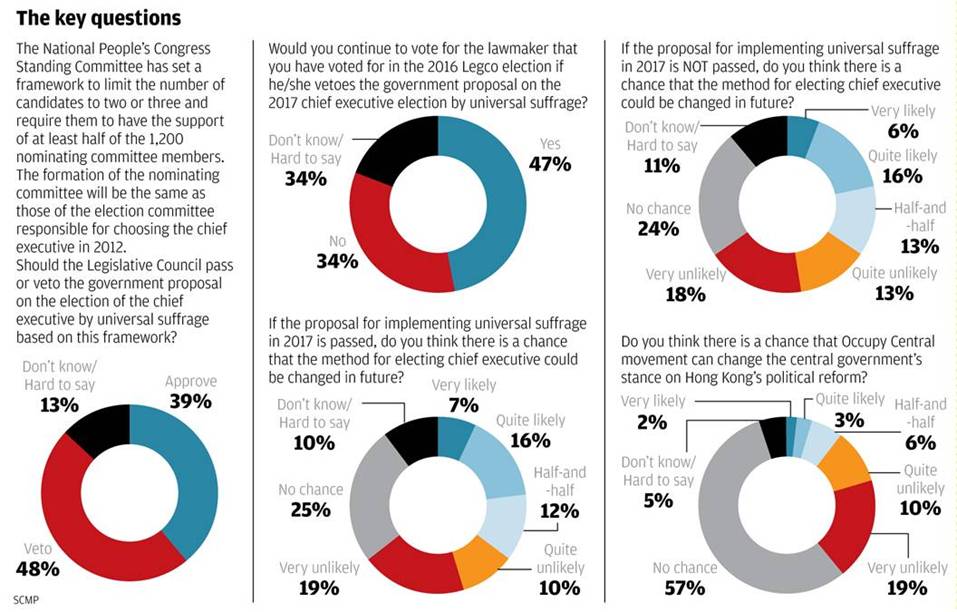South China Morning Post sponsored “Survey on Political Reform” Back
Released on 15/9/2014 by South China Morning Post; online from 15/9/2014
|
| Research Background | Research team members | Contact Information | Frequency tables | Crosstab analysis | Related news report | |
|
The research instrument used in this study was designed entirely by the POP Team after consulting the South China Morning Post, all fieldwork operations, data collection and analysis were carried out independently by POP, in other words, POP has full independence in the survey design and operation and would take full responsibility for all the findings reported herewith. |
|
Research team members
|
Survey Date |
: |
4-11/9/2014 |
Survey Method |
: |
Telephone survey conducted by real telephone interviewers |
Target Population |
: |
Cantonese-speaking Hong Kong citizens aged 18 or above |
Sampling method |
: |
Telephone numbers are randomly generated using known prefixes assigned to telecommunication services providers under the Numbering Plan provided by the Office of the Communications Authority (OFCA). Invalid numbers are then eliminated according to computer and manual dialing records to produce the final sample. If more than one eligible subject had been available, the one who had her birthday next was selected. |
Sample size |
: |
1,008 successful cases |
Overall response rate |
: |
64.3% |
Sampling error |
: |
Standard error less than 1.6%, that is, sampling error of percentages not more than +/-3.1% at 95% confidence level |
* In order to increase the representation of the results, the survey figures have been rim-weighted according to provisional figures obtained from the Census and Statistics Department regarding the gender-age distribution of the Hong Kong population in 2014 mid-year and the educational attainment (highest level attended) distribution collected in the 2011 Census. Figures in the report are prevailed according to the “weighted” sample. |
[Q1] The National People’s Congress Standing Committee has set a framework to limit the number of candidates to two or three and require them to have the support of at least half of the 1,200 nominating committee members. The formation of the nominating committee will be the same as those of the elction committee responsible for choosing the chief executive in 2012. Should the Legislative Council pass or veto the government proposal on the election of the chief executive by universal suffrage based on this framework?
|
[Q2] Would you continue to vote for the lawmaker that you have voted for in the 2016 Legco election if he/she vetoes the government proposal on the 2017 chief executive election by universal suffrage?
|
[Q3] If the proposal for implementing universal suffrage in 2017 is passed, do you think there is a chance that the method for electing chief executive could be changed in future?
|
[Q3gp] If the proposal for implementing universal suffrage in 2017 is passed, do you think there is a chance that the method for electing chief executive could be changed in future?
|
[Q3b] If the proposal for implementing universal suffrage in 2017 is not passed, do you think there is a chance that the method for electing chief executive could be changed in future?
|
[Q3bgp] If the proposal for implementing universal suffrage in 2017 is not passed, do you think there is a chance that the method for electing chief executive could be changed in future?
|
[Q4] Do you think there is a chance that the Occupy Central movement can change the central government’s stance on Hong Kong’s political reform?
|
[Q4gp] Do you think there is a chance that the Occupy Central movement can change the central government’s stance on Hong Kong’s political reform?
Photo source: South China Morning Post
|
Crosstab analysis (Chinese only)
|
|
|
| Research Background | Research team members | Contact Information | Frequency tables | Related news report | |








